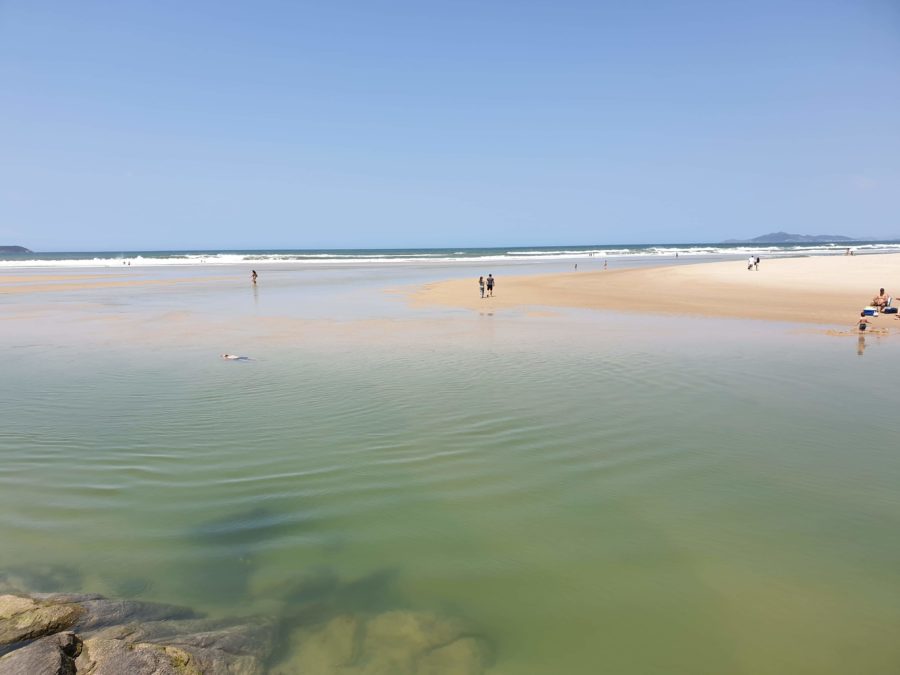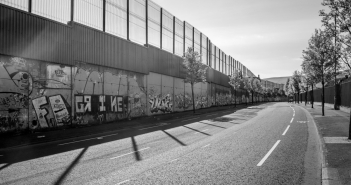As a child I had recurring dreams of great waves crashing over me. Some would swallow me up, making me lose consciousness. In others I would reach the top of a hill, where I would observe the sea level slowly rising from afar, engulfing the fishing village in which I still live.
My village is in a protected area in southern Brazil. The place is an idyllic meeting point, where hills, river, white sand dunes and the sea merge into a breath-taking view. The river, called Madre, meaning mother, dances through the wetlands, appearing like a serpent before it reaches the sea. Most days its floodplain lies well away from the houses on the coast line.
Lately, however, we are observing higher tides and the shrinking of the sandbank. This year winter arrived late and was shorter than usual. We experienced extreme heat alternating with cold days that interfered with the mullet’s reproduction cycle. As a result the fishing season was shorter than usual.
Climate fluctuation is increasingly evident, affecting the rhythms of nature and impacting on livelihoods.
For millions of people around the globe, the climate breakdown is a living reality rather than a far off prediction. According to the Internal Displacement Monitoring Centre, 17.2 million[i] people fled their homes in 2018, due to storms, hurricanes, floods, other cataclysmic weather events or environmental shifts. Those living in the Philippines, China and India have been most adversely affected by these phenomena.
Climate change and forced displacement are the defining challenges of our times.
In the wake of climate breakdown last month António Guterres, the United Nations Secretary-General hosted the 2019 Climate Action Summit in New York, calling for concrete action to meet the global climate predicament.
In spite of being in the company of many of the world’s most powerful political leaders, the star of the summit was clearly a Swedish teenager who had just crossed the Atlantic Ocean in a zero-carbon sailboat. Greta Thunberg, climate activist and global phenomenon, managed to capture all our attention. In a powerful speech addressed to governments, businesses and civil society, she condemned world leaders for betraying younger generations, and for indolence in response to the climate collapse and its attendant human costs.
I was moved and indeed overjoyed to observe Greta calling humanity’s attention to a dimension often excluded from these talks – the human and ecological costs of our destructive economic system and fossil fuel-addicted societies.
Visibly emotional, she uttered the now famous words: ‘people are suffering; people are dying; entire ecosystems are collapsing; we are in the beginning of a mass extinction, and all you can talk about is money and fairy tales of eternal economic growth.’
At a stroke Greta had restored the language of care to climate talks, having underpined her arguments with reference to the science.
In as much as we must address issues related to carbon emissions, build creative and sustainable solutions, and change our economic systems and modes of production, the conversation must include climate justice for those on the frontline of climate change. We will only understand forced displacement in the context of climate breakdown once we revive within ourselves the language of care for others, for all living beings, and for the planet itself.
Unless we humanise the lived experience of those forced to flee hurricanes, floods and droughts, we will continue to externalise the human cost of climate breakdown, and carry on with business as usual: the “fairy tales of eternal economic growth.”
If the images of Cyclone Idai, which hit Mozambique, Zimbabwe and Malawi, and Hurricane Dorian – the strongest storm ever to land in the Bahamas – do not awaken concern and care for the victims of climate breakdown, then humanity seems doomed.
Often I have a sense of hopelessness. I understand many people share similar responses and feelings. When I feel overwhelmed and insignificant in the face of this global crises I take refuge in silence.
As an adult working with communities displaced by wars, poverty and weather events, my childhood dreams now support me. At times, caught up in the here and now, I am immersed in the sea of action; at other points, I pause and step back to reflect, restore and witness the larger picture.
To my mind, these are complementary movements sustaining an open heart and active hands in a world in crisis. As I delve inwardly I observe my motivations. I connect with my principles and values, I feel the pain of a suffering world. As I emerge outwardly, I align my actions and speech with deeper aspects of myself. They are the in-breath and out-breath of sacred activism, that operate like the seasons of my existence.
To confront widespread climate breakdown, and the despair this brings, one must connect with the language of deep care for the Earth and all living beings. Then we can respond from a place of transformation and embody a new way of living and relating to the planet.
SUPPORT Cassandra Voices with a Patreon Donation CLlCK HERE
[i] Internal Displacement Monitoring Centre, ‘Global Report on Internal Displacement 2019’, http://www.internal-displacement.org/global-report/grid2019/




